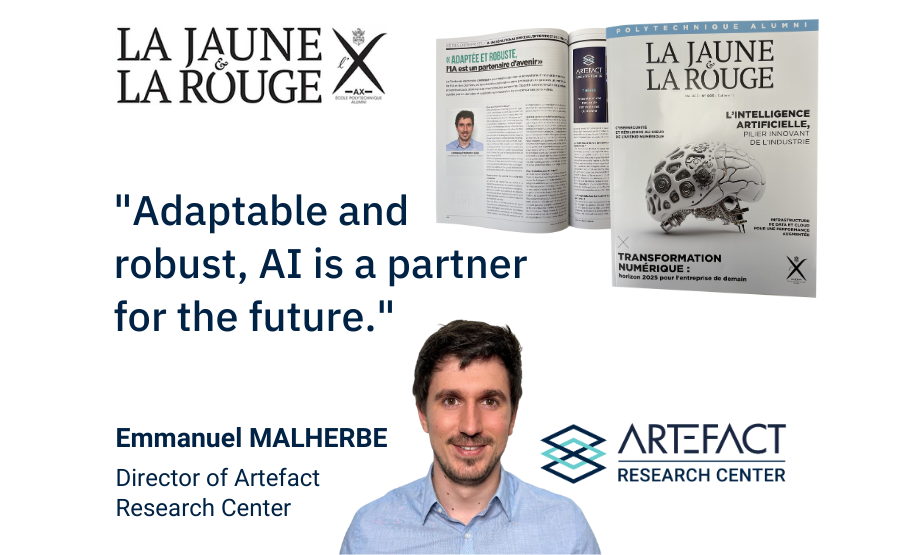The Artefact Research Center's mission is to foster an innovation ecosystem around AI and data by encouraging collaboration between university professors and representatives of international partner companies.
The goal: cutting-edge research driven by data and the industrial applications of its partner companies.
What is Artefact's DNA?
Artefact is an engineering consultancy specializing in AI and data. A European leader present in 23 countries with a strong footprint in France, it employs 1,700 people, a large proportion of whom are engineers. Artefact supports its client companies in their AI and data projects, covering strategic issues like data governance all the way through to the development and deployment of models.
Our teams composed of data scientists, software engineers, and data analysts can deploy a wide range of machine learning techniques in applied cases. The objective: operate across the entire value chain so that clients can fully leverage AI.
Artefact also has other facets, such as the School of Data, which focuses on retraining professionals, and the organization of major events in France like AI for Health or Adopt AI.
Tell us about Artefact's Research Center
The research center is dedicated to open-source research. Its mission is to improve AI in business applications to make it more usable and better suited to needs. We aim to break the perception of machine learning as an uncontrollable black box.
To this end, the center is divided into two areas of expertise: applied mathematics to improve models from a statistical perspective; and management science which treats companies and organizations as objects of study. We examine how they adopt technology and imagine potential improvements.
How do you operate?
Above all, we conduct scientific research not for profit. Our work results in scientific publications and international conferences. Unlike consulting, which moves very quickly, the research center operates on a longer timeline. We build partnerships between academic experts and companies that bring real-world challenges. This correlation allows us to tackle concrete use cases by accessing the databases of partner companies. The goal is to test and improve our methodologies on these large-scale, real-world problems.
A revolution for retail?
Retail is a data-heavy sector, particularly through checkout receipts. By adapting to this structure, artificial intelligence can "decode" the ticket, since each listed product can be seen as a word, connected to others.
This enables us to predict consumer habits and tailor stores accordingly. We can capture product interactions to, for instance, display complementary products together or avoid "cannibalization" between products or promotions. We are convinced that this use of data is the future of retail. AI will never replace the experience and know-how of a department manager or retail partner, but it can make them even more effective by bringing valuable insights from data.
A crucial tool in the banking sector too?
Once again, Artefact doesn't aim to replace financial analysts, who have excellent domain expertise. However, they can't detect all vulnerable clients or fraudsters. Using scoring models trained on historical data, we can flag unusual client profiles and anticipate negative events before they become real problems. Since analysts must justify their decisions, which is a regulatory requirement, we work on building scoring systems that are explainable and offer interpretable reasons for high-risk profiles.
So AI enhances human capabilities at work?
Absolutely. I often use the example of Google. When you search something online, an analysis occurs. Machine learning queries trillions of web pages, something impossible without automation. The time saved by the algorithm represents all the groundwork humans no longer need to do. AI works similarly. Ultimately, it is always the human who chooses to adopt, or not, the result and give it meaning. It started with book searches, continued with the rise of the internet and Wikipedia, and now continues with today's technologies. And this isn't stopping anytime soon.
What are the challenges of generative AI, in your view?
There's been a turning point, especially with ChatGPT, in how the public adopts new technologies. For the first time, we've seen something take hold from the bottom up: employees started finding good ways to use ChatGPT as a helpful tool in their work. From Artefact's perspective, the key issue is framing these technologies within specific use cases. Rather than using a general-purpose tool for everything, the aim is to build robust applications for precise tasks.
Right now, these models lack robustness, they retrieve information from their memory in ways we don't fully understand, risking inappropriate or even absurd outputs. We're working, for example, on a simple yet reliable confidence index to display to users. The goal is both to avoid misleading information and to encourage a critical mindset toward the model's responses.

 BLOG
BLOG






